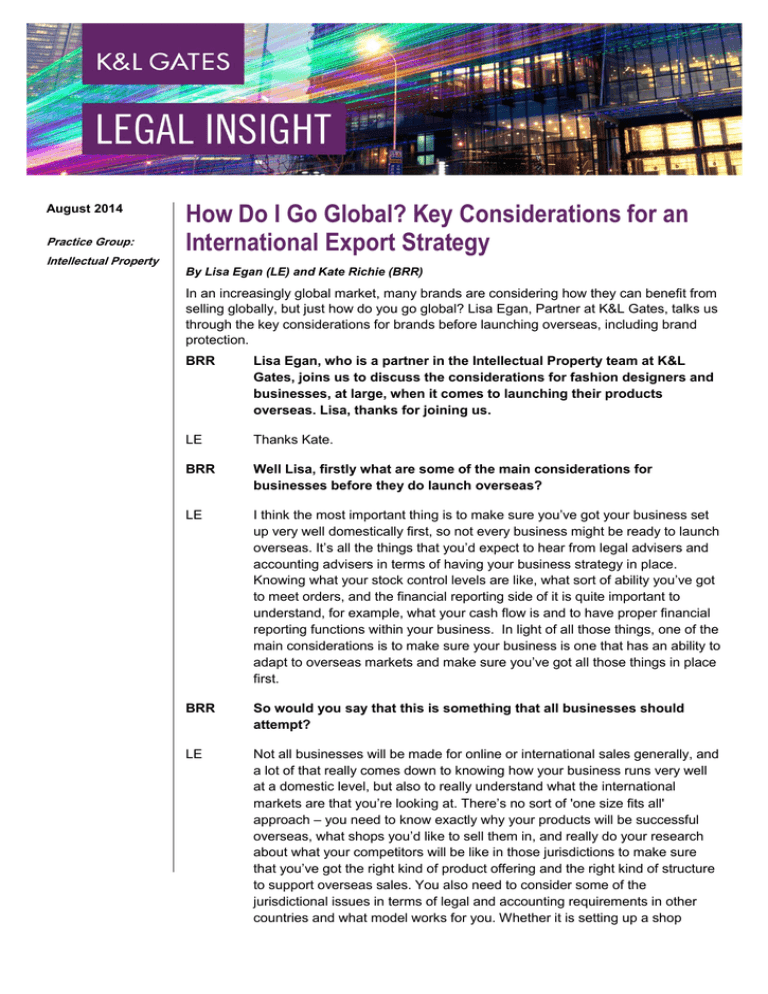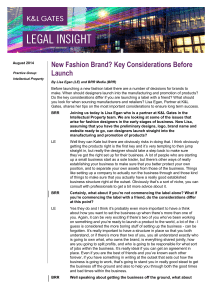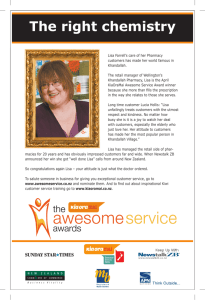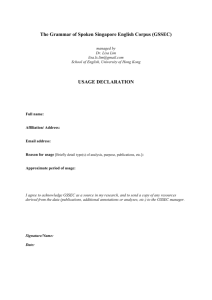
August 2014
Practice Group:
Intellectual Property
How Do I Go Global? Key Considerations for an
International Export Strategy
By Lisa Egan (LE) and Kate Richie (BRR)
In an increasingly global market, many brands are considering how they can benefit from
selling globally, but just how do you go global? Lisa Egan, Partner at K&L Gates, talks us
through the key considerations for brands before launching overseas, including brand
protection.
BRR
Lisa Egan, who is a partner in the Intellectual Property team at K&L
Gates, joins us to discuss the considerations for fashion designers and
businesses, at large, when it comes to launching their products
overseas. Lisa, thanks for joining us.
LE
Thanks Kate.
BRR
Well Lisa, firstly what are some of the main considerations for
businesses before they do launch overseas?
LE
I think the most important thing is to make sure you’ve got your business set
up very well domestically first, so not every business might be ready to launch
overseas. It’s all the things that you’d expect to hear from legal advisers and
accounting advisers in terms of having your business strategy in place.
Knowing what your stock control levels are like, what sort of ability you’ve got
to meet orders, and the financial reporting side of it is quite important to
understand, for example, what your cash flow is and to have proper financial
reporting functions within your business. In light of all those things, one of the
main considerations is to make sure your business is one that has an ability to
adapt to overseas markets and make sure you’ve got all those things in place
first.
BRR
So would you say that this is something that all businesses should
attempt?
LE
Not all businesses will be made for online or international sales generally, and
a lot of that really comes down to knowing how your business runs very well
at a domestic level, but also to really understand what the international
markets are that you’re looking at. There’s no sort of 'one size fits all'
approach – you need to know exactly why your products will be successful
overseas, what shops you’d like to sell them in, and really do your research
about what your competitors will be like in those jurisdictions to make sure
that you’ve got the right kind of product offering and the right kind of structure
to support overseas sales. You also need to consider some of the
jurisdictional issues in terms of legal and accounting requirements in other
countries and what model works for you. Whether it is setting up a shop
How Do I Go Global? Key Considerations for an International Export
Strategy
overseas or having a distributor or an agent appointed over there, or if it’s just
your online sales. All of these will involve slightly different considerations.
BRR
Well Lisa, I’m sure that most businesses and fashion designers know
that it’s really important to protect their designs in Australia, but how
important is it for them to make sure their designs are protected before
they do launch in overseas markets?
LE
Yes, I think that’s an important consideration, certainly in terms of your brand
itself. You really need to have your brand registered as a trade mark in
Australia if you’re trading here, but also in any of the international countries
you’re looking at trading in. It is important to be aware of some of the
considerations around that, in particular, as some countries have a first to file
approach, so if you haven’t filed for your trade mark in, for example, China
and you start selling or manufacturing there, someone else could file the trade
market as soon as they see there’s another brand coming into the market and
it will then be very hard to get it back, so you really need proper advice at the
outset about trying to have that brand protection in place at the earliest
possible stage. That’s also to make sure that, by selling in another country,
you’re not going to be doing anything that might infringe someone else’s
rights because there may well be another party you don’t know of that has a
trade mark already registered.
The same is true for design protection filing in Australia. It is obviously crucial
if you’re selling here, and different countries have different regimes for how
you can protect your design or your copyright works like fabric prints, so,
again, it’s important to get good advice at the outset because a lot of the time,
unless you file the application before you’ve actually launched in that
jurisdiction or often if you’ve launched anywhere internationally, you might not
have a right left to register. Some of those things are important to consider at
the earliest possible opportunity.
BRR
Well there’s some good advice for businesses there, Lisa, thanks so
much for joining us.
LE
Thanks very much Kate.
BRR
That was Lisa Egan, who is a partner in the Intellectual Property team, at
K&L Gates. Now listeners, if you have any questions for Lisa you can
send them through by either using the panel on your screen or via email
to law@brrmedia.com.
Authors:
Lisa Egan
lisa.egan@klgates.com
+61.3.9205.2099
2
How Do I Go Global? Key Considerations for an International Export
Strategy
Anchorage Austin Beijing Berlin Boston Brisbane Brussels Charleston Charlotte Chicago Dallas Doha Dubai Fort Worth Frankfurt
Harrisburg Hong Kong Houston London Los Angeles Melbourne Miami Milan Moscow Newark New York Orange County Palo Alto
Paris Perth Pittsburgh Portland Raleigh Research Triangle Park San Diego San Francisco São Paulo Seattle Seoul Shanghai
Singapore Spokane Sydney Taipei Tokyo Warsaw Washington, D.C. Wilmington
K&L Gates comprises more than 2,000 lawyers globally who practice in fully integrated offices located on five
continents. The firm represents leading multinational corporations, growth and middle-market companies,
capital markets participants and entrepreneurs in every major industry group as well as public sector entities,
educational institutions, philanthropic organizations and individuals. For more information about K&L Gates or
its locations, practices and registrations, visit www.klgates.com.
This publication is for informational purposes and does not contain or convey legal advice. The information herein should not be used or relied upon
in regard to any particular facts or circumstances without first consulting a lawyer.
© 2014 K&L Gates LLP. All Rights Reserved.
3





